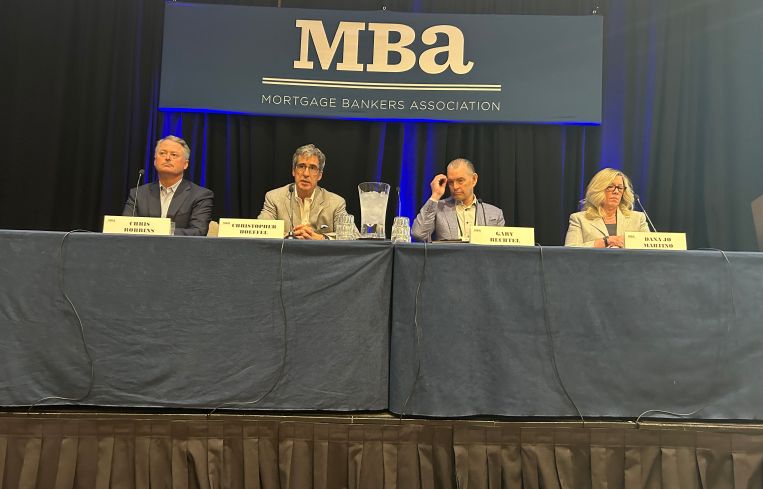MBA CREF 2024: Adaptive Reuse Projects Driving Uptick in Financing Requests
By Andrew Coen February 14, 2024 1:35 pm
reprints
In the midst of largely frozen debt markets with many property owners saddled by antiquated assets, a growing number of borrowers are seeking financing tools for adaptive reuse projects as a path to hit the reset button.
Lenders at the annual Mortgage Bankers Association Commercial/Multifamily Finance Convention and Expo (known as MBA CREF) conference Tuesday noted that financing demand is high for the repurposing of certain buildings, despite a higher interest rate environment.
Gary Bechtel, CEO of Red Oak Capital, said he has received many requests of late for loans to convert non-chain hotel or motel properties into affordable housing. He said this type of conversion development works far better than transforming office properties to multifamily or hospitality assets, primarily because of challenges with floor plates coupled with necessary rewiring and plumbing expenses. “There is a significant lack of affordable housing and workforce housing in this country, so it is much more cost effective to repurpose a building and make it affordable housing,” Bechtel said during the MBA CREF session, “Construction and Adaptive Reuse Lending,” at the Manchester Grand Hyatt San Diego. “It’s a great repurpose, and we are looking at a lot of that.”
Bechtel added that he has also conducted a few conversion projects of late from older retail or industrial buildings into self-storage centers. He said this type of project makes sense for either a large retail property that once housed a closed business like Kmart or for warehouses that have become “functionally obsolete” due to low ceiling heights.
Christopher Hoeffel, president of Counterpointe Sustainable Advisors, also said he has done plenty of hotel/motel conversions to affordable housing. He noted a key element of these projects ultimately working out is making sure takeout construction risks are addressed.
The MBA CREF construction and adaptive reuse panel also featured Chris Robbins, managing principal of GreenRock Capital, a Commercial Property Assessed Clean Energy (C-PACE) lender, and Dana Jo Martino, senior vice president of Berkadia‘s servicing team, who was the moderator.
Robbins noted that C-PACE loans are playing an integral role for some of the few property owners who have managed to receive financing for office to multifamily conversions to help arm sponsors with capital to undergo floor plate adjustments and other necessary upgrades. In addition to C-PACE and senior debt, landlords can also utilize historic tax credits for some office-to-multifamily conversions, according to Robbins.
“You could have a nice capital stack to provide financing to convert these things,” Robbins said.
Bechtel said private bridge lenders like Red Oak are playing an important role with financing conversion projects since banks are largely on the lending sidelines now and would require low leverage for this type of construction loan. He noted that most banks will require loan-to-value of around 65 percent for construction loans while Red Oak will lend at a far higher price point.
“The other thing with banks is especially in times like this if you are not already a customer of the bank, you are going to have to come up with a depository relationship,” Bechtel said. “It is going to have to be full recourse and lower leverage and is not going to be nearly as aggressive.”
Andrew Coen can be reached at acoen@commercialobserver.com


